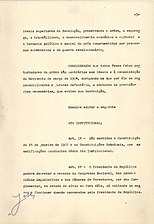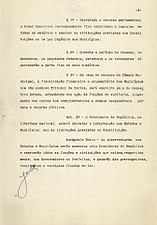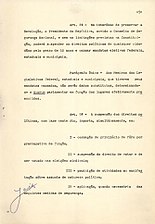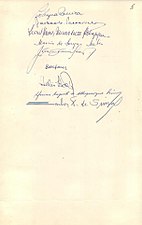Institutional Act Number Five

Institutional Act Number Five (Portuguese: Ato Institucional Número Cinco), commonly known as AI-5, was the fifth of seventeen extra-legal Institutional Acts issued by the military government in the years following the 1964 Brazilian coup d'état.
AI-5 suspended most civil rights, including habeas corpus, allowed for the removal from office of opposition politicians, federal interventions in municipalities and states. It enabled institutionalization of arbitrary detention torture, and extrajudicial killing by the regime. It was issued by President Artur da Costa e Silva on December 13, 1968.[1][2]

Institutional Acts were not subject to judicial review, and superseded both the previous 1946 constitution and the 1967 constitution enacted by the regime.[3][4] By suspending habeas corpus, the AI-5 enabled human rights abuses by the regime.[5]
Sometimes called o golpe dentro do golpe ('the coup within the coup'), AI-5 was the most impactful of all Institutional Acts.
Written by then Minister of Justice Luís Antônio da Gama e Silva, it came as a response to reactions against the regime, such as a demonstration by over fifty thousand people in Rio de Janeiro protesting the murder of student Edson Luís de Lima Souto by a member of the state Military Police, the March of the One Hundred Thousand, and the denial by the Chamber of Deputies of authorization to prosecute Congressman Márcio Moreira Alves, who had called Brazilians to boycott the September 7 Independence Day celebrations. It also aimed to consolidate the ambitions of a hardline faction within the regime which was unwilling to relinquish power in the foreseeable future.
Consequences
The immediate consequences of the AI-5 were:
- The President of the Republic was given authority to order the National Congress and the State Legislative Assemblies into forced recess,[6] as well as Municipal Councils.[7] A powerful military General thought that the Congress being closed was a "blessing." Costa e Silva used this power almost as soon as AI-5 was signed, resulting in the closure of the National Congress and all state legislatures except that of São Paulo for almost a year. The power to order the National Congress into recess would be used again in 1977.[8]
- the assumption by the President of the Republic and the Governors of the States, during the periods of forced recess of the federal and state Legislatures, respectively, of the fullness of the legislative power, enabling the President and the Governors to legislate by decrees with the same force and effect as statutes passed by the legislative Chambers. This power included the power to legislate constitutional amendments. A sweeping amendment of Brazil's 1967 Constitution (already adopted under the Military Regime) was promulgated in 1969 (Constitutional Amendment number 1, also known as the 1969 Constitution, because the entire altered and consolidated text of the Constitution was re-published as part of the Amendment), under the authority transferred to the Executive Branch by the AI-5.
- the permission for the federal government, under the pretext of "national security", to intervene in states and municipalities, suspending the local authorities and appointing federal interventors to run the states and the municipalities;
- the preliminary censorship of music, films, theater and television (a work could be censored if it was understood as subverting the political and moral values) and the censorship of the press and of other means of mass communication;[4]
- the illegality of political meetings not authorized by the police;
- the suspension of habeas corpus for crimes of political motivation;
- the assumption by the President of the Republic of the power of sacking summarily any public servant, including elected political officers and judges, if they were found to be subversive or un-cooperative with the regime. This power was widely used to vacate the seats of Opposition members in the Legislative branch, so that elections would be held as usual, but the composition of the Legislature resulting from the elections would be dramatically changed by the deprivation of office of Opposition legislators, effectively transforming the Federal, State and even municipal legislatures in rubber-stamp bodies. The deprivation of office of Opposition legislators also affected the makeup of the Electoral College of the President of the Republic (under the 1967 and 1969 Constitutions, adopted under the military regime, the President was chosen by an Electoral College made up of the entire National Congress, and of delegates chosen by the State Assemblies). Thus, not only elections for the Executive Branch were indirect, but the vacancies created in the composition of the Legislative bodies affected the makeup of the Electoral College, so that it also became a rubber-stamp body of the military regime.
- [9] By passing AI-5 the dictatorship could take away anyone's political rights for up to ten years, and put the death penalty back into effect;
- the instant legitimacy of certain types of decrees issued by the President, that were made not liable to judicial review. Under those provisions, the Institutional Acts themselves, and any action based on an Institutional Act (such as a decree suspending political rights or removing someone from office), were not subject to judicial review.
Rebel ARENA
The AI-5 did not silence a group of Senators from ARENA, the political party created to give support for the dictatorship. Under the leadership of Daniel Krieger, the following Senators signed a disagreement message addressed to the president: Gilberto Marinho, Miltom Campos, Carvalho Pinto, Eurico Resende, Manoel Villaça, Wilson Gonçalves, Aloisio de Carvalho Filho, Antonio Carlos Konder Reis, Ney Braga, Mem de Sá, Rui Palmeira, Teotônio Vilela, José Cândido Ferraz, Leandro Maciel, Vitorino Freire, Arnon de Melo, Clodomir Milet, José Guiomard, Valdemar Alcântara and Júlio Leite.[10][11]
The end of AI-5
On October 13, 1978, President Ernesto Geisel allowed Congress to pass a constitutional amendment putting an end to AI-5 and restoring habeas corpus, as part of his policy of distensão (détente) and abertura política (political opening).[4] The constitutional amendment came into force on January 1, 1979.[12]
In 2004, the celebrated television documentary titled AI-5 – O Dia Que Não Existiu (AI-5 – The Day That Never Existed), was released. The documentary analyzes the events prior to the decree and its consequences.
Gallery
Pages of the Institutional Act Number Five. National Archives of Brazil
- Page 1
- Page 2
- Page 3
- Page 4
- Page 5
- Page 6
- Page 7
- Page 8
- Page 9
References
- ^ "Governo Baixa Novo Ato", Folha de S.Paulo, December 14, 1968.
- ^ "Institutional Act Number Five - Wikisource, the free online library". en.wikisource.org. Retrieved 2023-11-11.
- ^ Situation in Brazil. CIA analysis and full text of AI-5
- ^ a b c Stein, E. A. (2012). "The Unraveling of Support for Authoritarianism: The Dynamic Relationship of Media, Elites, and Public Opinion in Brazil, 1972-82". The International Journal of Press/Politics. 18 (1): 85–107. doi:10.1177/1940161212460762. ISSN 1940-1612. S2CID 147226345.
- ^ "No Justice for Horrors of Brazil's Military Dictatorship 50 Years On". Human Rights Watch. 2018-12-13. Retrieved 2023-03-08.
- ^ "Brown University Library | Item | bdr:366676". repository.library.brown.edu. Retrieved 2018-04-24.
- ^ "Brown University Library | Item | bdr:690110". repository.library.brown.edu. Retrieved 2018-04-24.
- ^ "AI-5, o mais cruel dos Atos Institucionais" (in Portuguese). Archived from the original on 18 December 2008. Retrieved 2008-11-10.
- ^ "Costa e Silva | Brazil: Five Centuries of Change". library.brown.edu. Retrieved 2018-04-24.
- ^ Sem acesso ao presidente, senadores deixam mensagem de protesto no portão do Palácio das Laranjeiras. Archived December 19, 2008, at the Wayback Machine
- ^ "Brown University Library | Item | bdr:367083". repository.library.brown.edu. Retrieved 2018-04-24.
- ^ "Veja as nove páginas do Ato Institucional nº 5". Folha de S.Paulo (in Brazilian Portuguese). 8 December 2018. Retrieved 18 February 2021.
External links
- "30 Years Tonight". Retrieved 2008-11-10.
- AI-5 – O Dia Que Não Existiu at IMDb
- Official text of Institutional Act #5, from the Brazilian Civil House site (in Portuguese).
- Text of Institutional Act #5, from Universidade Federal do Rio de Janeiro (in Portuguese).









